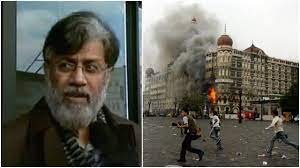In a significant development, a U.S. court has granted consent to the Indian government’s request, facilitated through the U.S. government, for the extradition of Tahawwur Rana, a Pakistani-origin Canadian businessman, to India. Rana is sought for his alleged involvement in the notorious 2008 Mumbai terror attack.
The extradition request was initiated by India on June 10, 2020, when the country filed a formal complaint seeking the provisional arrest of Tahawwur Rana. The Biden Administration has expressed its support for and subsequently approved the extradition of Rana to India, marking a step forward in the pursuit of justice for the victims of the Mumbai attacks.
The 2008 Mumbai terror attack was a horrifying incident that shook the entire world. A group of heavily armed terrorists, believed to be associated with the Pakistan-based militant organization Lashkar-e-Taiba, carried out a series of coordinated attacks across Mumbai, India’s financial capital. The siege lasted for four days and resulted in the tragic loss of over 160 innocent lives, including both Indian and foreign nationals, and left hundreds of others injured.
Tahawwur Rana, born in Pakistan and later becoming a Canadian citizen, has been accused of providing support and assistance to the terrorists involved in planning and executing the Mumbai attacks. According to the charges against him, Rana had allegedly used his immigration services firm in Chicago as a cover to aid and abet the attackers. He was convicted in the United States in 2011 for his involvement in a separate plot to attack a Danish newspaper that had published cartoons depicting the Prophet Muhammad.
India’s extradition request was built on compelling evidence and the determination to hold Rana accountable for his alleged role in the Mumbai attacks. The decision by the U.S. court to consent to the extradition request signifies the recognition of India’s legitimate concerns and the commitment to international cooperation in combating terrorism.
Extradition is a complex legal process that involves the cooperation between two countries’ judicial systems. It requires satisfying several legal requirements, including evidence of probable cause and ensuring that the rights of the accused are protected. The consent given by the U.S. court demonstrates a recognition of the strength of the case presented by the Indian authorities and the adherence to the principles of justice.
With the extradition process approved, Tahawwur Rana will now be transferred to Indian custody to face trial for his alleged involvement in the Mumbai attacks. This significant development represents a step forward in the pursuit of justice for the victims and their families, as well as a strong message against terrorism and those who support it.
The extradition of individuals involved in acts of terrorism reinforces the international community’s determination to combat this global menace collectively. It highlights the importance of cooperation and mutual assistance between countries in bringing perpetrators to justice and preventing the recurrence of such heinous acts.
The decision to extradite Rana to India also underscores the strengthening ties between the United States and India in the fight against terrorism. Both nations share a common goal of ensuring the security and safety of their citizens and are committed to working together to address the global threat posed by terrorism.
As the legal proceedings move forward, it is crucial to ensure a fair and impartial trial for Tahawwur Rana, where he can present his defense and the evidence against him can be scrutinized thoroughly. The extradition process serves as a reminder that justice will be pursued relentlessly, irrespective of the passage of time, and that those responsible for acts of terrorism will be held accountable for their actions.
The consented extradition of Tahawwur Rana to India brings hope for the victims’ families, the survivors, and the entire nation affected by the Mumbai attacks. It is a significant step in the ongoing battle against terrorism and serves as a reaffirmation of the global commitment to combating this menace and bringing justice


